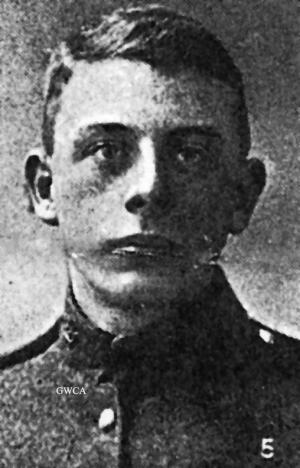Circumstances of Casualty: Killed in Action. During an intense bombardment of the front line trenches occupied by his Battalion he was instantly killed when a shell exploded directly beside him and practically blew him to pieces.
Location of Unit at Time of Casualty: The Bluff, South East of Ypres.
BX June 29, 1916
Private Albert Norman Sage Reported Killed in Action
Mrs. Minnie Sage of 183 Elgin Street received word this morning that her son, Private Albert Norman Sage of the 4th Battalion had been killed in action on June 16. Private Sage left Brantford with the 36th Battalion and was drafted to the 4th and was at the front with it.
Private Sage was 20 years of age and a single man, and had been in the trenches for eight months. Before enlisting, he worked in the spring department at Ham and Nott’s. His father and mother, two brothers and three sisters survive him. One of the brothers, Driver Ernest Sage of the 13th Battery has been in the trenches for eight months. His other brother, Leonard is at home. Mrs. James Mead and Mrs. Arthur Usher of Brantford and Mrs. Edward Parker of Niagara Falls are sisters.
Two of Private Sage's brothers-in-law are in khaki. Private Mead is with the 125th Battalion and Gunner A. Usher is in the trenches with the 13th Battery, of which Pte. Sage was a member.
BX July 5, 1916
Particulars of Private Sage’s Death – Shell Struck Him While He Was in a Bay of the Trench
The following letter, recently received by Mrs. Sage from Sergeant A. Davis, B. Company, 4th Battalion, 1st Canadian Division, Flanders, gave Mrs. Sage the particulars of the death of her son Albert, who was killed in action on June 14. As the letter shows, he was much loved and highly respected among his comrades. Enclosed in the letter was the pocketbook of the deceased hero, with one corner cut out, apparently by a piece of shell. The letter was as follows:
Dear Mrs. Sage,
It is with great regret that I write you these few lines to tell you that Albert was killed in action on June 14, at about 10 o’clock in the morning, and to tell you the full particulars of his death as near as I can get them from the men who were with him.
Albert was a member of our grenade platoon and it was whilst taking part in an attack that the trench he had reached came under particularly heavy shellfire. A shell burst in the bay in which he had taken shelter and all the occupants were killed instantly. The men who were close to him went to his assistance, but they tell me that death was instantaneous and he did not suffer at all.
His comrades have asked me to write for them and to express their sincerest sympathy with you in your sad loss. Albert was well liked by all the members of his platoon and was a splendid soldier and every inch a man.
I hope I have not been too cool in writing this, but I can assure you that it is a very hard task for me to do, as I knew Albert so well. I will try to see Ernie and break the sad news to him as soon as possible.
Once again tendering the sincerest sympathies of his fellow comrades and myself, I remain.
Yours sincerely,
Albert Davis

